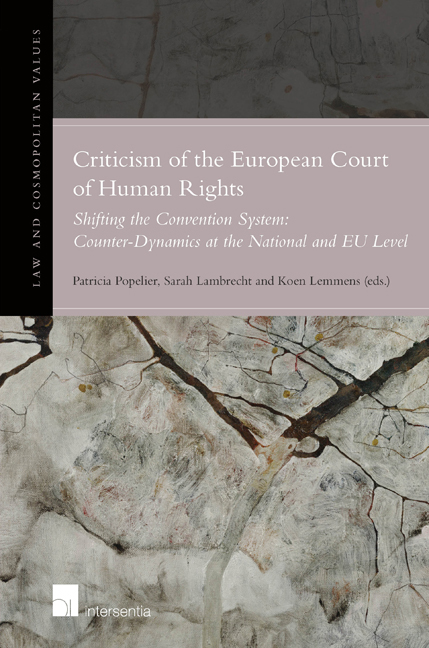 Criticism of the European Court of Human Rights
Criticism of the European Court of Human Rights from PART II - SPARSE CRITICISM
Published online by Cambridge University Press: 13 December 2017
The Republic of Poland was the second post-communist country in the region to join the Council of Europe, on 26 November 1991. The European Convention on Human Rights (Convention or ECHR) was ratified by Poland on 19 January 1993 and entered into force on 1 May 1993. Thus, for more than twenty years the Convention, as an element of European public law, has been an instrument influencing and oft en shaping (next to other sources) the legal reality of the Republic of Poland. Poland has acceded to most of the Protocols that added rights (for the time being with the exception of Protocol no 12) and that changed procedural aspects. For years, Polish legislation has been highly criticised by the European Court of Human Rights (ECtHR). However, in the last two years (until January 2015) the position of Poland in the statistics of the ECtHR improved, removing the country from the top list of Member States subject of claims and cases appearing in Strasbourg. The Polish cases before the ECtHR mainly concern two issues: length of judicial proceedings and excessive length of detention on remand.
The European Convention on Human Rights is perceived as one of the “external” constitutional sources of rights in Poland. According to Article 87 of the 1997 Constitution, the international agreements ratified with the agreement of Sejm (Lower Chamber of Polish Parliament) are binding sources of law. Although the Convention was ratified before the adoption of the 1997 Constitution, its content corresponds to those agreements that require this type of qualified ratification. According to Article 91 of the 1997 Constitution, such agreements form part of the internal legal order and prevail over statutes. If a statute cannot be reconciled with the Convention, the ECHR enjoys priority over it. According to the same Article of the 1997 Constitution, international agreements ratifi ed with the agreement of Sejm are directly applicable.
Even before the adoption of the 1997 Constitution, the Convention and ECtHR jurisprudence have been regularly invoked by all supreme courts of Poland (Sąd Najwyższy -Supreme Court, hereafter SN; Naczelny Sąd Administracyjny – Chief Administrative Court, hereafter NSA and Trybunał Konstytucyjny – Constitutional Tribunal, hereafter TK).
To save this book to your Kindle, first ensure [email protected] is added to your Approved Personal Document E-mail List under your Personal Document Settings on the Manage Your Content and Devices page of your Amazon account. Then enter the ‘name’ part of your Kindle email address below. Find out more about saving to your Kindle.
Note you can select to save to either the @free.kindle.com or @kindle.com variations. ‘@free.kindle.com’ emails are free but can only be saved to your device when it is connected to wi-fi. ‘@kindle.com’ emails can be delivered even when you are not connected to wi-fi, but note that service fees apply.
Find out more about the Kindle Personal Document Service.
To save content items to your account, please confirm that you agree to abide by our usage policies. If this is the first time you use this feature, you will be asked to authorise Cambridge Core to connect with your account. Find out more about saving content to Dropbox.
To save content items to your account, please confirm that you agree to abide by our usage policies. If this is the first time you use this feature, you will be asked to authorise Cambridge Core to connect with your account. Find out more about saving content to Google Drive.